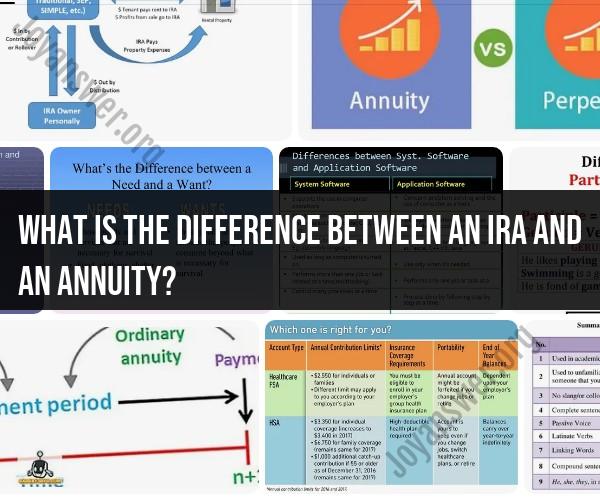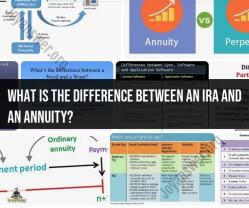What is the difference between an IRA and an annuity?
Individual Retirement Accounts (IRAs) and annuities are both investment options commonly used in retirement planning, but they have distinct differences in how they work and the benefits they offer. Here are the key differences between an IRA and an annuity:
1. Purpose:
IRA (Individual Retirement Account): An IRA is a tax-advantaged retirement savings account that individuals can use to save for retirement. IRAs are designed to provide a way for individuals to invest and grow their retirement savings over time. There are different types of IRAs, including Traditional IRAs, Roth IRAs, and others, each with its own tax treatment.
Annuity: An annuity is a financial product offered by insurance companies that provides a stream of income payments, either for a specified period or for life, in exchange for a lump-sum payment or a series of premium payments. Annuities are typically used to create a guaranteed source of income in retirement.
2. Tax Treatment:
IRA: Traditional IRAs offer tax-deferred growth, meaning that contributions may be tax-deductible, and investment gains are not taxed until you withdraw funds in retirement. Roth IRAs, on the other hand, offer tax-free withdrawals in retirement, but contributions are made with after-tax dollars.
Annuity: Annuities can offer tax-deferred growth similar to traditional IRAs. Earnings within the annuity are not taxed until you make withdrawals. However, tax treatment can vary depending on the type of annuity and the specific circumstances.
3. Investment Options:
IRA: IRAs provide a wide range of investment options, including stocks, bonds, mutual funds, exchange-traded funds (ETFs), and other investment vehicles. The investment choices within an IRA are determined by the individual account holder.
Annuity: Annuities are typically structured as insurance contracts and offer a more limited range of investment options. Common annuity types include fixed annuities (which offer a guaranteed interest rate), variable annuities (which allow you to invest in sub-accounts similar to mutual funds), and indexed annuities (which provide returns based on a specific index).
4. Ownership and Control:
IRA: The account holder has full control over the investments within the IRA. They can make investment decisions, contributions, and withdrawals according to IRS rules and regulations.
Annuity: Annuities are contracts with insurance companies, and the control over the underlying investments may be more limited. The terms and conditions of the annuity contract dictate how funds are invested and when income payments begin.
5. Income Stream:
IRA: IRAs are primarily investment accounts that can be used to accumulate savings for retirement. While you can withdraw funds from an IRA at any time, there may be penalties and taxes for early withdrawals before age 59½.
Annuity: Annuities are designed to provide a regular income stream, either immediately or at a later date. They are often used to create a guaranteed source of retirement income, especially in later stages of retirement.
6. Legacy Planning:
IRA: IRAs can be passed on to heirs, and beneficiaries can inherit the account with certain tax advantages. The rules for inheriting IRAs depend on whether the account is a Traditional or Roth IRA.
Annuity: The legacy planning options for annuities may vary depending on the specific terms of the contract and the type of annuity. Some annuities may offer beneficiary options, while others may not provide a legacy benefit.
7. Fees and Costs:
IRA: The fees associated with IRAs can vary based on the investment choices and the financial institution where the IRA is held. Common fees include management fees, transaction fees, and custodial fees.
Annuity: Annuities often come with fees and expenses, including insurance charges, administrative fees, and investment management fees. These fees can reduce the overall return on the investment.
In summary, while both IRAs and annuities are retirement planning tools, they serve different purposes and offer different benefits. IRAs are investment accounts that provide tax advantages for accumulating savings, while annuities are insurance contracts designed to provide guaranteed income in retirement. The choice between them depends on individual financial goals, risk tolerance, and retirement income needs. It's important to carefully consider the features, costs, and tax implications of each option before making a decision. Consulting with a financial advisor can also help you determine the most appropriate retirement planning strategy for your situation.
IRA vs. Annuity: Differences in Retirement Savings
Individual retirement accounts (IRAs) and annuities are both retirement savings vehicles, but they have some key differences.
IRAs are tax-advantaged accounts that allow you to save for retirement on a tax-deferred or tax-free basis. There are two main types of IRAs: traditional IRAs and Roth IRAs.
Traditional IRAs allow you to make deductible contributions, which lower your taxable income in the year you make the contribution. Your contributions grow tax-deferred, and you pay taxes on the withdrawals in retirement.
Roth IRAs allow you to make after-tax contributions, which means you don't get a tax deduction for the contributions. However, your contributions grow tax-free, and you can withdraw them tax-free in retirement.
Annuities are insurance contracts that provide you with a guaranteed income stream in retirement. You can purchase an annuity with a single lump-sum payment or with a series of payments over time.
Comparing Individual Retirement Accounts and Annuities
Here is a table comparing IRAs and annuities:
| Feature | IRA | Annuity |
|---|---|---|
| Tax treatment of contributions | Tax-deferred or tax-free (depending on the type of IRA) | After-tax |
| Tax treatment of withdrawals | Taxable in retirement | Tax-free or taxable (depending on the type of annuity) |
| Guaranteed income stream | No | Yes |
| Flexibility | More flexible | Less flexible |
| Fees | Typically lower | Typically higher |
Choosing Between an IRA and an Annuity for Retirement Planning
The best retirement savings vehicle for you depends on your individual needs and goals. If you are looking for a flexible account with tax advantages, an IRA may be a good option for you. If you are looking for a guaranteed income stream in retirement, an annuity may be a better choice.
Here are some things to consider when choosing between an IRA and an annuity:
- Your retirement goals: What do you want to achieve with your retirement savings? If you want to have a flexible stream of income in retirement, an IRA may be a good option. If you want to have a guaranteed income stream in retirement, an annuity may be a better choice.
- Your risk tolerance: How much risk are you comfortable with? IRAs are subject to market risk, but annuities are not. If you are not comfortable with market risk, an annuity may be a better choice for you.
- Your fees: Annuities typically have higher fees than IRAs. Be sure to compare the fees before you make a decision.
If you are not sure which retirement savings vehicle is right for you, it is a good idea to talk to a financial advisor. They can help you assess your needs and goals and choose the right vehicle for you.












